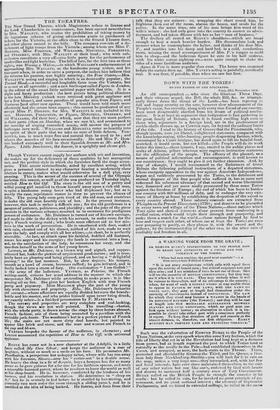REEVE has come out in a new character at the
Adelphi, in a little farce called My Own Ghost ; and keeps the audience in a roar of laughter, without so much as a smile on his face. Ile personates Mr. Pearlbutton, a prosperous but unhappy tailor, whose wife has run away with his foreman, Shears—now his " cutter-out" in a double sense. He leaves the shop in a fit of despair, buys a hempen boa for as many pence as he gave guineas for a fur one for his faithless spouse, and rents a miserable haunted garret, where he resolves to leave the world as well as his shop-board. He is. however, comforted by the kindness of his hostess, and his resolution is shaken. He determines to "sleep on ;" but he is scarcely in bed before he is startled by hammering, and Presently two men enter the room through a sliding panml, and he is horrified at the idea of being burked. He listens, and finds from their talk that they are coiners : so, wrapping the sheet round him, he frightens them out of the room, alarms the house, and sends for the police. In the mean time, one of his men brings bun word of his wife's return : she had only gone into the country to answer an adver- tisement, and had taken Shears with her as her" man of business."
The drollery all rested on REEVE'S shoulders—which are broad enough to bear a much heavier burden. His disconsolate look and manner when Ile contemplates the halter, and thinks of his dear Mrs. P., and tumbles into his damp and hard bed, in a cold, comfortless room, missing the usual accompaniment of Mrs. P.'s tongue to scold him to sleep—and the ludicrous figure he cuts in his half undress, with his white cotton nightcap on—were quite enough to shake the sides of a more fastidious audience.
Agnes de Vere is more popular than ever. The house was crammed before the curtain drew up. Mrs. YATES'S acting is painfully, terrifically real. It was finer, if possible, than when we saw her first.




















 Previous page
Previous page